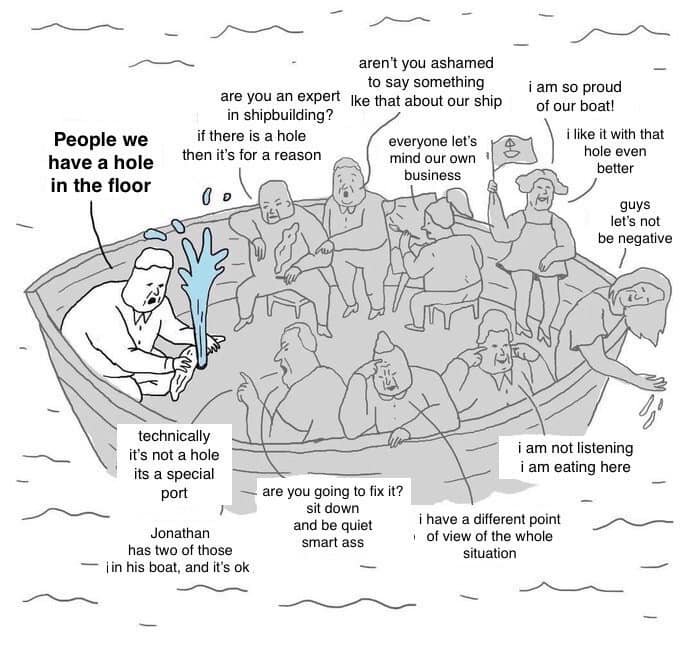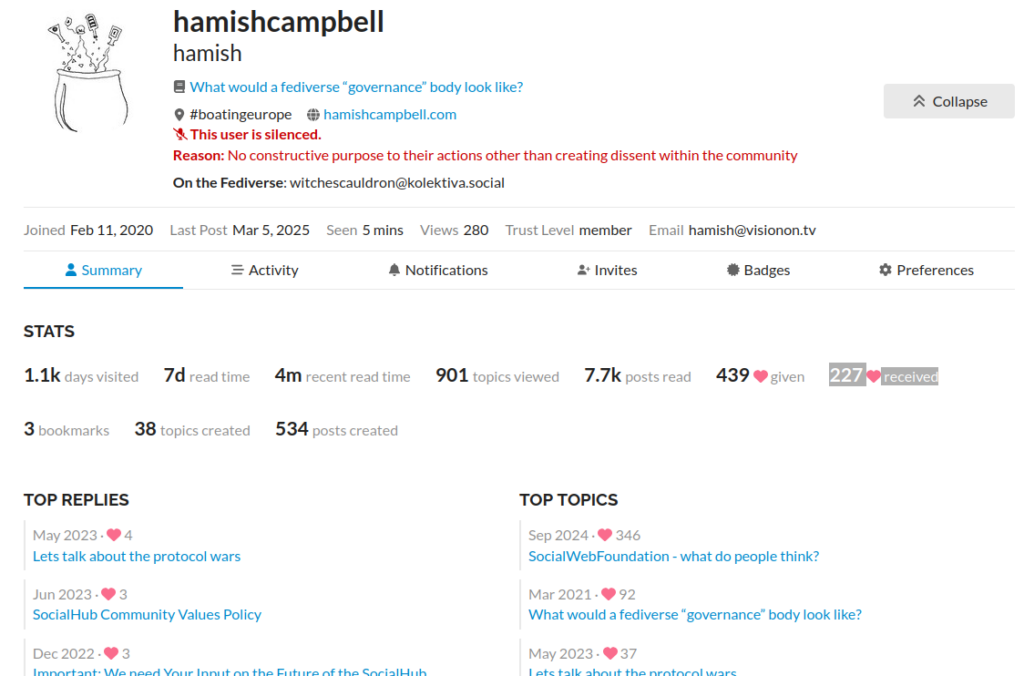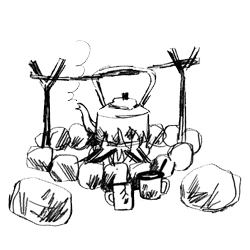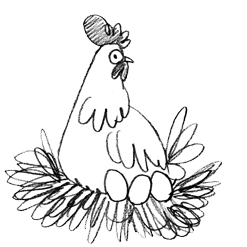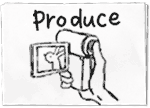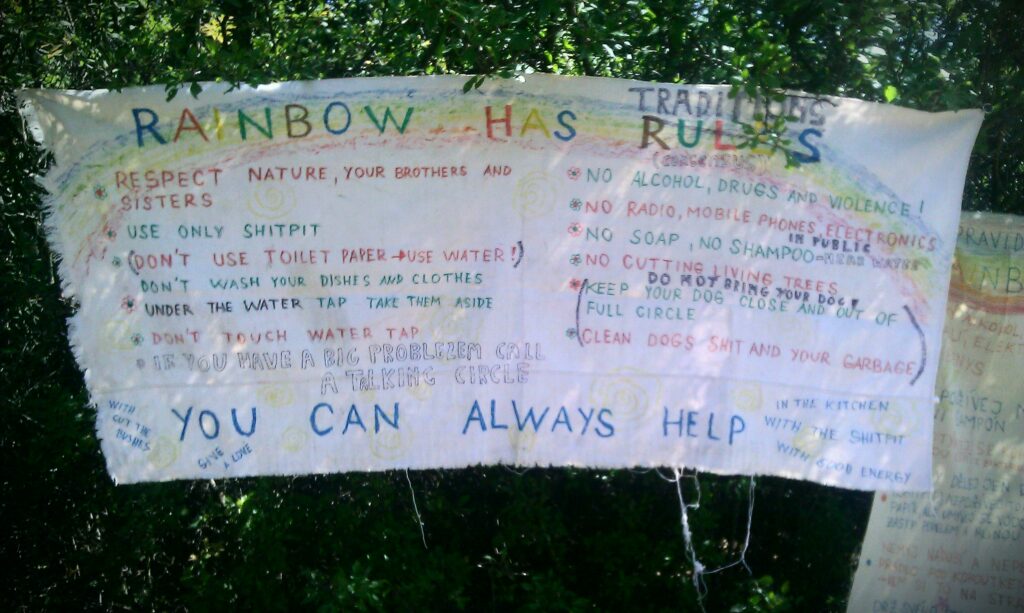A DRAFT story about markets, misfits, and taking back the commons (Tagline: “They came for the avocados. They left with revolution.”)
by Hamish Campbell
Outline
THE MARKET STIRS
- Chatsworth Rhythms
Setting the scene: It’s a Saturday in East London. The smell of jerk chicken, sourdough, and incense wafts over Chatsworth Road. A young stallholder, Luna (17), sells upcycled clothes and zines with radical poetry. Her best mate Jaz (18) roasts coffee in a converted horse trailer.
The street market has always been the soul of the area, but rent hikes, council interference, and #NGO co-option have worn everyone down. Traders are being squeezed. Street teams from the council show up to enforce arbitrary rules. One old vendor has a panic attack and is carted off.
A new app quietly arrives via a local anarcho-sysadmin named Mo, who says: “If you don’t write the rules, someone else will. Time to fork society.”
- Enter the #OGB
The Open Governance Body app isn’t flashy – it’s command-line chic – but it gives people a voice and power through messy consensus-based decision-making.
At first, Luna is skeptical, more tech? More admin? But when she sees how traders start voting on layout, fees, and security, she joins. The app federates with other tools she’s already using, se is a bit of a geek (Pixelfed for promo, Lemmy for discussion).
They tag the system with #OGB, calling their movement “Open Trader Network” #OTN.
A new energy flows. People start collaborating across stalls. Rota for clean-up? Done via the app. Newcomer priority stalls? Voted in. It works. It’s messy, but it’s theirs.
THE SPRAWL
- Nodes Spread
Other markets – Brixton, Ridley Road, Chapel – start installing OGB instances. Local flavours, same base. Word spreads via the Fediverse. A hashtag storm of #OMN blossoms across PeerTube vlogs and Mobilizon events.
Local food traders begin direct-networking across markets. No middlemen. No rent-seekers. One market hosts a “Reclaim the Tomato” day after a supply chain collapse – 1,000 people show up.
They aren’t waiting for permission any-more.
- Media Panic
A Murdoch-owned paper runs a headline: “Markets Hijacked by Extremist App: ‘Digital Anarchists’ Threaten City Order.”
Talking heads say the traders are anti-business, anti-modern, anti-safety. A Guardian columnist calls it “well-meaning chaos” and suggests NGO mediation.
The mayor calls it “a dangerous precedent for public space management.” A government white paper proposes a ban on “unauthorised digital governance.”
Luna gets doxxed. Her hacked Instagram DMs are read out on GB News. Jaz’s trailer is graffitied. Mo is arrested during a dawn raid.
THE STALLS STRIKE BACK
- The Communing
Traders unite across London. “Reclaim the streets”. We built this with our hands, our sweat, and our beans.” They go on strike, not by stopping, but by refusing to recognize council control.
The Fediverse lights up. Mastodon servers amplify local voices. A livestream on PeerTube shows a giant puppet of the mayor being pelted with rotten bananas.
Instead of retreating, people start federating public spaces. Parks, squats, skateparks, each with their own federated #OGB nodes.
Councils panic. The government attempts a DNS take down of #OGB. They don’t understand federation. Nothing central to ban.
- Trust vs Control
Luna speaks at a huge public forum, “The Town Hall of the Streets,” organized via Mobilizon. “You can’t run a market on fear. You can’t govern people who trust each other. You can only try to sell them back what they already have.”
Jaz releases a viral zine: ‘We the Traders’ – a manifesto of federated life. It’s printed in three languages by Somali aunties on Ridley Road.
THE SHIFT
- The Fall of the Gatekeepers
The mayor resigns after a leaked email shows collusion with private surveillance firms. A public audit reveals widespread misused funds and fake community consultations.
Instead of chaos, the federated markets flourish. An emerging culture of trust, transparency, and local flair grows to replaces the back peddling NGO management class.
Luna and Mo help to push the #OGB into schools and libraries. Jaz co-founds P2P hand to hand USB key decentralized delivery network using bike couriers.
- New Normals
Final scene: Luna is now 21. She runs a stall at the market she helped free. The OGB screen is mounted next to her zines – open to everyone. A group of teenagers crowd around to vote on that week’s theme: Fruits, Freedom, or Future?
She smiles. The market hums. The commons holds.
Themes
StupidIndividualism vs #4opens #CollectivePower
Mainstreaming = control + fear Grassroots = trust + mess
Power is not seized, it is federated
If you can federate it, you can free it
The Story
Chapter One: Market Day
Luna arrived just after nine. Her stall was already half set up, two folding tables, a clothes rail, a crate of homemade zines, and a sign that read: Upcycled. Unowned. Unapologetic.
Chatsworth Road was busy. A steady flow of people moved past, hipsters, locals, tourists, and regulars from the nearby estates. The usual mix of food stalls, second-hand clothes, and bric-a-brac. A few of the traders nodded as she walked in.
She checked her phone. No messages. Good. She didn’t want a distraction. The last few weeks had been tense, rumours of new council inspections, talk of fees going up again. There was a meeting planned, but no one trusted the “consultation” process any more.
Jaz appeared from the stall opposite, a reused horse trailer turned coffee hatch. “Council are here,” he said, handing her a coffee. She looked down the street. Two officials in branded jackets stood near the fruit stall, checking tablets and talking quietly. They weren’t buying anything. “Third week in a row,” Luna said. “They’re looking for something to shut down,” Jaz replied. “Heard they’re targeting the people without formal pitch licenses.” Luna didn’t reply. She just took a sip of the coffee and turned back to her stall.
That’s when Mo showed up. No one really knew where he lived. He wasn’t a trader, but he was always around. People said he used to work in tech and walked out during the pandemic. He carried a laptop in his bag and ran a small, unofficial Wi-Fi network that half the market used without realising. He handed her a folded piece of paper. On it, a QR code and the words: OGB – open governance body – not an app – a process
“What is this?” she asked. “Tool for sorting things out. No bosses, no gatekeepers. You decide. You build.” She looked at him. “We already tried that. Committees. Petitions. Nothing changes.” “This isn’t for asking,” he said. “It’s for doing.” He turned and walked off. She scanned the code anyway.
What loaded was basic. A simple page, a login prompt, some instructions. Anyone with the link could register. Anyone could propose a change. Decisions were made collectively. Everything was logged and public. Later that day, someone proposed a rota for waste collection. Five people voted. Then ten. By the end of the day, the bins were sorted.
Luna didn’t say anything. But she noticed. Something had shifted.
Chapter Two: Something New
The next morning, Luna opened the stall before ten. Rain had passed in the night, and the tarmac still held patches of damp. She unzipped the plastic cover from her rail and checked the #OGB app on her phone. Six new proposals. Someone wanted to trial a shared delivery scheme. Someone else suggested swapping stalls once a month to mix things up. The waste rota from yesterday now had over thirty names. She didn’t say it out loud, but something felt different.
Jaz joined her a little later, dragging a crate of clean mugs and a half-repaired sandwich board. “People are talking,” he said. “Like, actually talking. Outside their stalls.” Luna nodded. She’d noticed too. Normally, people kept to themselves. Competition had a way of doing that – especially when everyone was fighting for a spot and a margin.
But today… She saw Fatima, who ran a fruit and veg stall at the corner. Usually quiet, head down, fast hands. She was standing with Andre, the secondhand tools guy, comparing stall layouts on their phones. Both were logged in to #OGB. “Fatima thinks we can make more space for walk-throughs if we stagger the setups,” Andre told her when she passed. “Easier for wheelchairs. More space for queues.”
“Is that on the app?” Luna asked. Andre held up his phone. “Second from the top. Vote’s still open.” On the other end of the street, Amina and her teenage sons, who sold hot food and chai under a big canvas awning, were chatting with Tom, who made hand-pulled noodles on a cart he wheeled in from Clapton each weekend. They were drawing lines in chalk on the pavement- marking a shared seating area.
By midday, the market felt different. Not louder, not busier. Just… more connected. Mo returned in the afternoon. He wasn’t alone this time. With him was Nari, a coder from the south side who ran a quiet Mobilizon server out of her housing co-op. She wore overalls, no expression, and carried a beat-up laptop covered in tape. “Looks like it’s working,” Mo said to Luna, glancing around. Nari added, “You’ll need moderation tools soon. Growth means friction.” Luna wasn’t sure what she meant by that, but she wrote it down.
Later, they held a loose meeting near the benches outside the community hall. Jaz made coffee. Someone brought leftover samosas. Luna recognised a dozen faces, but others were new, people from other markets who’d heard what was happening and wanted to learn more. “We tried this in Tower Hamlets,” said one, a woman named Grace who sold second-hand electronics. “Council shut it down in three weeks. Said it was ‘disruptive to existing partnerships.’” “We’re not asking this time,” Mo replied.
Chapter Three: federate and Spread
By the third weekend, the idea had started to move. It began with a quiet message from a stallholder at Ridley Road, posted in the OGB working group: “Could we copy this setup? Our traders are fed up too. Same rules. Same threats. We want in.” No one said no. That was the point. Mo added a note in the main thread: “Just install it. Each market’s a node. Connect when you’re ready. Shared values, local control.”
Within days, there were new #OGB instances in Brixton, Wood Green, and Walthamstow. Different template layouts, different needs, same code, same network. A delivery driver named Eli helped hook up the networks. He already had a route between Ridley and Hackney and started shuttling hardware and surplus goods between markets. “No middlemen,” he said. “No #dotcons apps taking 30%.”
Meanwhile, Tasha, a baker from Camden Lock, joined the Chatsworth group to learn how the app was being used. “We’ve had five layers of management and three rounds of ‘consultation’ this year,” she said. “No one’s actually listened to a trader since 2009.” At the edges of the council bureaucracy, a few people noticed what was happening. Ravi, a junior urban planning officer in Hackney Council, joined one of the #OGB meetings under his personal account. “This isn’t bad policy,” he said one evening, voice calm, camera off. “It’s just outside the frame they allow for. You’re building governance, not just feedback. That scares people.”
Luna watched the comments scroll. More users joined every day. She couldn’t always tell who was a trader, who was a tech, who was just watching. Then came the backlash. The first article appeared in a small industry newsletter: “Traders adopt rogue decision-making platform. Officials express concern over legality.” No byline. But it was picked up.
By the following week, a local tabloid ran a front page: “MARKET ANARCHY: Hackney Traders Reject Council, Use Shadow App” Inside, it quoted an anonymous “source close to the mayor” calling the movement “dangerous, divisive, and incompatible with good governance.”
A blog on a tech site posted screenshots from #OGB, mocking its “ugly interface” and “pseudo-utopian design language.” On Twitter, a property developer called it “the return of squatters with QR codes.” Then came the calls.
A reporter door steeped Jaz’s trailer pretending to be a customer. When he found out she was press, he shut the hatch and texted Luna: “It’s starting. They want a villain.”
Mo went dark for a few days. Nari added new permission layers to the Chatsworth instance. Luna started getting strange DMs.
But at the same time… more people joined. A group from a Sunday farmers’ market in Lewisham wanted advice. A kids’ clothes collective in Tottenham asked for templates. A new Mobilizon event popped up titled: “Decentralised Governance for Public Space: How To Not Get Co-Opted.”
Even a quiet email arrived, from a .gov.uk address. A policy advisor, asking for a demo.
Chapter Four: We Write the Story
The storm didn’t slow them down. If anything, it made things clearer. At the next open meeting – hosted outside the old library building – over 40 people showed up. Stallholders, musicians, artists, teachers, kids. Even two students who said they were “just here to help document.” Luna stood at the edge, watching as Nari connected her laptop to the projector powered by a battered solar rig.
The screen flickered to life: OGB – Chatsworth Node Active proposals: 14 Active users: 312 Linked nodes: 5
“This is not a platform,” Nari said, addressing the group without looking up. “It’s a process. A tool to federate trust.” She explained how it worked: Anyone trough trust paths can propose an action or change. The community decided what threshold of agreement was needed – majority, consensus, rotating moderation. Anyone could fork the process, by federation if trust brakes down. No lock-in, no central server. Every action is transparent and archived. You could see who voted, when, and how. Linked markets can share decisions, or stay autonomous.
“Messy? Yes,” Nari said. “But it’s our mess.” A few heads nodded. Others typed silently on their phones. Jaz leaned over to Luna. “Better than three forms and a six-week wait for someone to move a bin.” She half-smiled. Truth. And not just metaphorically.
The local sanitation crew, led by a bin worker named Kev, who’d grown up nearby – started attending meetings in plain clothes. He said the market folks were easier to work with than “the suited managers upstairs.” “We just want to know the plan,” Kev shrugged. “If your app tells us where the blockages are, saves us wasting time, why wouldn’t we check it?”
Soon after, Luna spotted a uniformed officer, PC Daoud, off-duty but listening quietly by the coffee cart. He was local. Born three streets over. Later, he reached out through a private chat: “They’re watching you from HQ, but… not all of us think this is wrong. Safer with eyes on it, than locked out.”
Meanwhile, Ravi, the junior urban planning officer who’d joined under a pseudonym, kept feeding small insights back. “Your bin heatmap tool? We copied it at the council. Quietly. Everyone thinks it’s one of ours.”
A local Green councillor, Tanya Okeke, asked to speak at the next open forum. She didn’t try to claim credit. She just said: “Look, we’ve been told this is insurrection. But if the system doesn’t listen, it’s not treason to talk to each other. It’s survival. You’re building what we’ve only talked about.” Her speech was posted to PeerTube, captioned and translated into three languages. The title:“Commons, Not Chaos.”
As pressure mounted in the press, the group shifted strategy: stop reacting – start broadcasting. Zey, who ran a handmade electronics stall and freelanced in media activism, suggested reaching out to the Fediverse project @indymediaback@fedi.town. “They’ve been tracking grassroots stuff – library occupations, community gardens, Palestine solidarity encampments. If they cover us, we get a different signal out.”
Mo sent the message. Within 24 hours, the story appeared on a Mobilizon event and in a long-form post on Lemmy:
“London’s Markets Are Forking Power: How #OGB Is Building the Next Commons” re-posted on Mastodon, PeerTube, WriteFreely. Translated into Spanish and Somali overnight
The response was instant. People from Glasgow, Bristol, even Milan and Athens boosted the post. Small markets in other cities started federated instances. A public librarian in Sheffield messaged: “Could we use this to run our building? The council wants to close it.”
Within days, Luna noticed a shift in tone online. Instead of only backlash, there were now defenses. When trolls came for Jaz on the #dotcons, people linked to their #OGB instance logs. When tabloids mocked the process, someone posted a PeerTube video:“A Day in the Market: Democracy Without Permission.”
It went semi-viral. Not huge. But enough.
The new #Indymediaback project started running updates daily – short, factual, sometimes poetic:
No central server to ban. No single leader to smear. No funding stream to freeze. Just 500 stalls and a growing idea: You don’t need permission to care for your commons.
Even Luna’s mum forwarded it to her. “Did you really build this?” she’d texted. Luna didn’t reply straight away. She just walked back to her stall, opened the app, and voted on a new proposal: Shared Childcare Tent for Saturdays. proposal by: Ana Status: Under Discussion
She tapped yes.
Chapter Five: Dirty Hands in Clean Suits
They should have seen it coming. The tabloids had been circling for weeks, sniffing for a headline. But nothing prepared them for the full-page hit in the Daily Spectacle:
“LONDON MARKETS TAKEN OVER BY ‘DIGITAL ANARCHISTS’ – IS YOUR NEIGHBOR A CYBER-COMMIE?”
Beneath the headline: a grainy photo of Jaz, pouring coffee. Under it, the caption: “Suspected organiser of secret tech cell controlling local economy via encrypted app.”
By midday, it was everywhere. Morning radio shows. Facebook rants. A YouTube grifter livestreaming outside the market, yelling about “foreign influence and crypto-fascism.”
Zey laughed bitterly. “We built a rota system. They think it’s a coup.”
But the damage was calculated, not random.
Kev, the bin crew lead, got called into an HR disciplinary. Accused of “coordinating with unauthorised software.”Ravi’s council account was suspended. PC Daoud disappeared from group chat. Silent.
Worse: a rumour started spreading that the #OGB app was foreign-funded. A #AI disinformation video, made to look like a BBC investigation, appeared on multiple right-wing Alt-news channels. It claimed the Chatsworth node was a front for “globalist collapse networks.” The comment wars were endless.
Then came the real blow. The Council filed a cease-and-desist against the “unauthorised operation of a parallel governance system.” A legal attack – framed in the language of cybercrime. It felt ridiculous, but real. Meetings got quieter. Some traders unplugged from the app. A few pulled out entirely, scared of losing their stalls.
That night, Luna stayed up redrafting a new info page on their WriteFreely site. Simple questions. Plain answers.
Is this legal? Mostly. We’re exercising coordination rights.
Is this funded? No. It’s free software, run by volunteers.
Is this dangerous? Not compared to rent increases, evictions, and ignored flooding protocols.
Meanwhile, Tanya Okeke – the Green councillor – stood up in the local chamber. She named names. Quoted logs. Challenged the smear. “This isn’t lawlessness. It’s governance. Just not yours.”
Clips from her speech hit the Fediverse hard. Boosted by thousands. Translated again and again. One remix turned it into a sound collage set to ambient loops. Zey uploaded it to PeerTube with the title: “Not Yours. Not Theirs. Ours.”
But behind the scenes, the team realised they needed to outpace the attack. Nari inviting the voices of linked markets to strategies. They met inside the app: voice, chat, notes, no hierarchy.
The Tottenham node suggested creating a #OMN redundancy both client server and p2p backup – so if one #OGB instance was taken offline, others could host its decisions and links. Peckham proposed a “data mirroring agreement” – a kind of mutual aid treaty for code. Brixton offered safe hosting outside the UK. Someone from Berlin, unknown but kind, added:
“We’ve seen this before. They attack what they can’t centralise.” The network shifted. Morphed – like roots growing deeper, not taller. They weren’t building a protest any more. They were building infrastructure. And infrastructure doesn’t panic.
Chapter Six: The Glitch Spreads
At first, it was silence. Jaz closed her stall for the first time in four years. Said it was “temporary.” Said she needed to repaint the sign. But the truth was – she couldn’t face the constant stream of customers, each one asking with cautious eyes, “What’s going on with the market thing?”
Nari’s hands shook every time her phone buzzed. She stopped answering unless it was from Zey or Mo. Even then, it took her a few seconds to breathe through it.
Luna, usually the glue, barely slept. The pressure to hold everything together crushed down hard. She’d started avoiding the app entirely – dreading what new node might go dark, what legal thread might appear next.
Mo was the only one who tried to keep spirits up. He showed up to the remaining market days with a battered Bluetooth speaker playing irish toons. But even he moved a little slower. Like the weight of watching his friends break apart was catching up.
One by one, they all started drifting into the library #OGB node’s voice calls. No pressure. No cameras. Just people talking while they made dinner, folded clothes, or sat in the bath. If, the librarian, hosted most nights. Her calm voice grounding people like a soft metronome.
Then came the call from Brixton. A full-blown solidarity strike. Not just markets – garden co-ops, transit collectives, even a radical postal network built on cargo bikes. They didn’t ask for permission. They just paused operations for 48 hours and posted one shared message: “We are infrastructure. We are people. We do not consent to digital feudalism.”
The message rippled. Peckham’s print collective turned it into a broadsheet. A primary school teacher in Camden reworded it into a children’s chant. The remix scene on PeerTube exploded with glitchcore and spoken-word overlays.
Still, the state struck back. New legislation was proposed overnight: the Secure Networks and Commons Compliance Bill. The language was vague but brutal: all decentralised software operating in civic contexts had to be registered, monitored, and approved.
No app could be autonomous. No node could be unlicensed. No commons could exist without a gatekeeper.
Tanya, the Green councillor, sounded near-broken when she spoke to Luna on a late-night call. “They’re scared. Not of you. Of the idea of you. That people might govern themselves and… not miss the masters.”
The crew met again, properly, for the first time in weeks. Not in the café, not in the app, but in the back of Jaz’s shut stall. They sat on crates and pallets. Mo passed round lukewarm tea. Jaz: “We can’t stop. We don’t stop.” Zey: “They’ll ban it. The app, the nodes, all of it.” Nari: “Then we roll out the #p2p code based on #dat”
Luna looked at the group. “Let’s not fight them on their terms. Let’s remind people what this actually is. Let’s roll out the update and hope it scales. then we push out the archive Logs, decisions documenting the forks, mistakes. People can see for themselves.”
That night, they began the fdroid app updates everything to the public. #Indymediaback picked it up immediately. “A river of the real. Too messy to fake. Too decentralised to stop.” The story tipped.
One morning, Jaz opened her phone to find her stall tagged in a new post: Solidarity from Nairobi Street Markets “You gave us the code. We’re giving it breath. #OGB #CommonsRising”
And then another. Athens Free Libraries Federation: “We have adopted the OGB. The glitch lives here too.”
And another. Rio Food Collectives: “We don’t just consume. We decide.”
Then came the real shock. A direct message, unsigned but traceable to a junior policy analyst at the Mayor’s Office: “There are those inside who still believe in public good. Hold the line.”
Then the signal app buzzed. An unlisted call. Luna answered. A voice whispered: “They’re going to try something tomorrow. Big. Broadcast. Legal theatre. Endgame move.”
Luna didn’t speak. Just listened. And when the call ended, she turned to the crew, breath shallow. “They’re going to break us tomorrow.”
Chapter Seven: The Turning Tide
The broadcast hit at 9am sharp. Every major news channel, every tabloid site. The Mayor, flanked by top advisors, stepped up to the mic. Behind them: the seal of the City of London and a projection of the OGB interface – screen-grabbed and labelled like a crime scene.
“These so-called ‘commons apps’ are a threat to public safety, economic stability, and national cohesion. We are initiating emergency take down procedures effective immediately.”
The speech was surgical. Calm. Laced with that special kind of power-polish only years of spin could achieve. And for a while, it worked.
Federated servers running key hubs of the OGB infrastructure began going dark. Hosting providers were pressured, DNS entries revoked. Even mirrors went quiet. The central fedivers network affectionately called the (something outa the antiglobalisation movement) – collapsed under legal threats.
It was chaos.
Jaz stared at her screen. “Everything’s gone. Even the backups.”
Zey slammed their laptop shut. “No. Just the core nodes. Not everything.”
Because the p2p update had gone live.
Quietly, while the press spun stories of a digital insurgency, hundreds of nodes had been switching over to the new peer-to-peer version, built on DAT tech, now called ogb.glitch. Not flashy. Not fast. But immune to takedown.
The main interfaces failed, but the side-channels kept talking, which refilled the main channels. With the #OMN rebuilding from offline backups, all the history started creeping back in over #p2p flows.
Food moved. Stalls opened. People came. And then… reinforcements arrived. Not in tanks or protests. In voices.
Whistleblowers. Junior coders from city IT teams. Delivery drivers. Public sector workers who still had root access to blocked networks. They began helping, quietly. Restoring mesh links in routers. Leaking internal memos. Sharing legal drafts before they hit Parliament.
Inside the Mayor’s office, dissent flared. And then something unprecedented happened. A large bloc of Labor Councillors defected – publicly. In an emergency assembly livestreamed across the city, they announced their resignation from the party and joined forces with the Greens and a new wave of independent civic actors. Their statement was clear:
“This is not about politics-as-usual. This is about the survival of democracy at the roots. We’re joining the commons.”
Under pressure from the split, and fearing a total collapse in support, the Mayor began to back-pedal. A new press release appeared mid-afternoon: “We will open consultation with representatives from the community tech sector and ensure any future frameworks include space for secure, citizen-led platforms.” It wasn’t a full retreat. But it was a crack.
And then came the final blow of the day. A snap national election was announced. Leaked from within Westminster, the story ran that the central government wanted to force a mandate – betting that fear of chaos would swing voters back to the center.
But on the streets, the story felt different. Jaz opened her stall again. Nari reloaded the Chatsworth node log. Zey smiled for the first time in days. The OGB network was flickering back to life – not everywhere, but enough.
Luna posted a new message: “You cant kill the spirit. She is like a mountain. She goes on and on… You can’t kill the spirit…”
Chapter Eight: The Open Reboot
Nari was the first to notice it. She had left her node monitor running overnight, expecting another flatline. But by morning, the logs were scrolling too fast to read. Not just London. Not even just the UK.
“ActivityPub traffic’s exploding,” she whispered. “Look at this… Barcelona. Lagos. Detroit. Christchurch. They’re all lighting up.”
The Fediverse had caught fire, but not in the usual way. This wasn’t drama or celebrity implosions. It was coordination. Real-time.
The Indymedia nodes were leading the charge, stitched into the #OMN backbone. The vibe was different from the chaotic, scandal-hungry timelines of the old #dotcons socialweb. These feeds were dense with practical updates: water access, mutual aid, cooperative building, market logistics. Livestreams from collective kitchens. Meshnet maps scrawled with handwritten overlays.
No algorithms. No trending tab. Just relevance through #hashtag trust and federation flows.
Zey leaned over Nari’s screen, watching a stream from a collective farm outside Athens coordinate crop deliveries with a London market co-op via a shared calendar. “This is… not small,” they said, almost reverently. Jaz pulled her phone from her apron, scrolling through updates from the streets.
“Paris sanitation unions using OGB noids.” “Madrid school collectives switch to federated class planning.” “Buenos Aires: street markets double size with #4opens logistics.”
The old dotcons – Facebook, Twitter (or whatever it was called this week), Uber-style delivery platforms, felt suddenly… quiet. Like abandoned malls. Still shiny, still there, but irrelevant. Their hold broken.
Even the mainstream news had started to shift. Faced with plummeting engagement and embarrassing public walkouts – editors, field reporters, even weather presenters quitting live on air- several legacy outlets began syndicating from the Indymedia feeds. At first they laughed it off. Called it “citizen novelty content.” But views followed function, and soon those grassroots stories outperformed everything else.
Inside the Mayor’s office, the cracks deepened. A quiet resignation from their comms director. A leaked photo of mid-level staffers working on a community garden run entirely via OGB logistics. A memo, never meant for the public, outlining contingency plans for joining the Green coalition if the polls swung harder.
And swing they did. Not toward a party. Toward a way. OGB was no longer just a tool. It was becoming a nervous system – a messy, redundant, unpolished one – but alive. And more importantly, trusted.
New alliances emerged daily. Regional collectives began interlinking through shared trust agreements. The federated school system in Madrid synced timetables with similar networks in São Paulo and Cape Town. It wasn’t perfect. But it didn’t need to be.
Zey closed their laptop and stood up. “We need a new stall. Not for food. For onboarding.” “And a kids’ area,” Jaz added. “They’re all using it anyway. Might as well teach them how it works.” Nari smiled. “The school across the street already federated their lunch program.” Luna sent the updates, tagged simply: #OpenWebRising
Chapter Nine: The Grasping Hand
It began with meetings. Lots of them. Invitations rolled in – some polite, some not. Government task forces. EU think tanks. UN tech forums. Ministry of Culture round tables. Suddenly everyone wanted a word with the crew, or with whoever they could scrape up as a “representative” of the OGB network.
“They want to help us scale,” Nari said flatly, deleting another email flagged ‘URGENT – INNOVATION PARTNERSHIP REQUEST.’
“They want to define us,” Luna muttered. “Then box us in.”
Some groups accepted. Older cooperatives, city-level digital officers, cautious nonprofit administrators, people tired from decades of struggle who welcomed a place at the new table, even if the table was being carried into the old halls of power.
Others resisted. Young collectives in Naples and Glasgow. Feminist tech crews in Kerala. Rooftop data gardens in Seoul. They rewrote the invites into public callouts. Every attempt to co-opt became a meme. Every attempt to regulate sparked a protest.
Jaz read aloud from a new decree the UK government had just published: “All public-facing federated applications must adhere to the National Digital Standards (2026 Revised), under supervision of the Central Technical Authority.”
Zey spat their tea. “So basically, sign over root access or get censored.”
The backlash wasn’t just legal. Media narratives tightened like a noose. Stories started to appear on major channels: Are Kids at Risk in Unregulated Fediverse Zones? Markets or Mobs? A Deep Dive into OGB’s Hidden Influence. New Terror Frontiers: Decentralised Networks and National Security.
Nari traced the story metadata. Half were ghostwritten by PR firms with ties to legacy telcos and tech investment groups. One came from an ex-OGB supporter who had jumped ship to a consultancy firm, now touting “digital demobilisation strategies.”
Then came the leak. An encrypted drop dumped anonymously onto several Indymedia nodes, verified by multiple journalists. Internal documents from the Department for Digital Oversight. Operation MIDAS: a coordinated plan to infiltrate key nodes, identify moderators, coerce ISPs, and trigger selective service outages.
The plan was simple: make the #openweb look unreliable, chaotic, and unsafe. Kill it with concern.
But the OGB network had matured. Node redundancy flows kicked in. The client servers built on a cluster of tech donated by old mutual aid infrastructure – wobbled under pressure but didn’t fall. Peer-to-peer overlays picked up the slack.
And then the unexpected happened. One of the whistleblowers was a senior architect at the National Infrastructure Cloud. They published a post on their federated account: “I’m done. They want to break what works just to keep control.”
Within hours, more followed. An education official from Bristol. A Berlin public transport scheduler. A junior Labour MP.
Then came the move. Labour fracturing agen openly, with a sizable Green coalition forming in Parliament. The Mayor spinning in press briefings, suddenly praising the creativity and resilience of the very projects she tried to regulate.
“We’re not stopping,” Zey said, eyes fixed on the code syncing across the screen. “They came for the network, and now the network is everywhere.”
Jaz nodded. “So what’s next?”
Nari smiled, voice low but clear.
“Now, we govern ourselves.”
Chapter Ten: Patterns of the Possible
The election came and went, but this time, something stuck. Not just new parties in power or familiar faces in different suits. What stuck was the refusal to return to the old rules. A hung Parliament forced new coalitions, but the Fediverse didn’t wait for permission.
Instead, it started governing. Not by decree, but by social trust flows building affinity groups of action.
Nari had been helping coordinate a cross-continental working group: meshnet devs in Montreal, sanitation unions in Mumbai, childcare cooperatives from Lisbon to Dakar. Their shared thread? How to federate decision-making without creating another hierarchy.
“Think grassroots, not top-down,” Luna said during a session broadcast on a rotating PeerTube instance. “Each node autonomous, but interoperable. Each accountable to the commons it serves.”
Cities joined not through deals, but through example. When Warsaw adopted the OGB stack to rebuild their transit planning, local fediverse nodes lit up with more nabourhood noids. Bangkok rewrote its urban flood protocols with open consultation channels, built directly into #Mastodon forks. A co-op in Johannesburg started exporting surplus energy via federated agreements, skipping their failing national grid entirely.
Jaz had started hosting live streaming (name of app?) weekly onboarding sessions at the old market stall – now more like a civic tech info booth. Kids ran federated games in the background while elders plotted data sovereignty campaigns between tea rounds.
“Feels like we’re writing a new horizontal constitution,” said Zey, watching a real-time map of global assemblies syncing through #OMN nodes.
But pressure still loomed. Old institutions tried to reassert dominance by offering ‘partnerships’ – always with terms. The World Bank launched a slick clone of the OGB platform called CivicBridge, complete with consultants and paywalled toolkits. Big Tech spun up their own “decentralised” pilots, riddled with telemetry hooks and dark patterns.
They underestimated the cultural shift. The new networks weren’t just tech, they were communities. Stories. Rituals of care and collective memory. Indymedia Globle ran a week-long series documenting how sewer workers in Mexico City and pirate radio collectives in Jakarta were in the face of #climatechaos federating disaster response protocols. Their slogan trended: “Infrastructure is Culture.”
Nari’s phone beeped, an alert from the assembly. Over 200 cities now federated under the wide #OGB commons protocols. Not aligned. Not ruled. Not centralised. Federated.
“We’re not exporting a model,” she reminded the crew. “We’re sharing patterns.” That night, under a protest-lit sky in downtown Berlin, Jaz took the mic at a solidarity gathering. “We said we’d take back the tools. Now we’re taking back the systems. Not to own them, but to share them.” The crowd responded, not with chants, but with synced updates. Nodes joining. Agreements forged. Decisions passed. Solidarity – not just spoken, but #4opens coded in.
Chapter Eleven: Friends in Strange Places
The billionaires didn’t know what to do with themselves. After a decade of preaching disruption, they now found themselves disrupted. No more keynote spots at summits that mattered. No new killer app – no app at all. Instead: a patchwork of community servers running software they couldn’t monetise, speaking in languages they hadn’t designed, powered by motivations they couldn’t understand.
Yet they tried. Burning Man came early that year. The usual desert cathedrals of ego and LED spiritualism, now rebranded as “decentralised renaissance zones.” A luxury dome near the core had a banner reading: “Protocols, Not Platforms: Sponsored by [REDACTED VENTURE FIRM].”
Two of the old tech bros flew in by private jet – posturing green. One of them, bearded and barefoot in designer hemp, had once founded a payment system that almost became a country. Now he waxed lyrical about “post-capitalist flows” while livestreaming to three million followers from a satellite uplink. “We really believe in empowering local nodes,” he said in a lavish conference panel. “That’s why we’re partnering with the new movement.” They weren’t.
Newspeak House in London – once a haunt for civic hackers and well-meaning technocrats, had become the scene of cautious negotiation. Some institutional figures, even legacy MPs, were genuinely curious. A few came humbly, asking real questions. Others came to shape, contain, co-opt.
Jaz was there one rainy Thursday for a panel: “Civic Tech and the Future of Infrastructure.” Zey sat beside her, arms folded. One of the billionaire emissaries stood to speak, a familiar face from old TED Talks. He gestured at the OGB graph on the wall like it was a product roadmap. “If we can integrate these primitives into an API layer, we could offer interoperability with enterprise cloud infrastructure. That way, everyone wins.”
Zey spoke before Jaz could. “You mean, you win. And we get eaten.” There was an awkward silence. “No thanks,” Jaz added. “We’re not here to scale into your stack. We’re here to compost it.”
Not everyone agreed. Some nodes, overwhelmed by demand or enticed by money and promises, signed conditional partnerships. These versions of the tools were slicker, smoother, branded, but neutered. Governance became consultation. #4opens paths closed. Trust mechanisms obfuscated.
Yet the originals held. Because the people did.
Burning Man ended. The jets left. Newspeak House emptied. And across the globe, the federated stack kept growing. Farmers in Kenya negotiating water rights. Street medics in Argentina syncing training protocols with ones in Oakland. Not corporate alliances. Not NGO frameworks. People-to-people federations.
And the tech bros? They tried to fork the culture. They built metaverse shells with fake local nodes and NFT-based “trust” metrics. But no one came. Not really. Because in a world rebuilt on shared care, scarcity wasn’t the incentive any more. Instead, the question was: who do you stand with? And in that question, the old guard had no real answer.
Chapter Twelve: Boring is Beautiful
By the third year, the #OGB was no longer a revolution. It was plumbing. Most people didn’t even think about it anymore, the same way they didn’t think about water or traffic lights – until they failed. But the #OGB rarely did. It became infrastructure, boring in the best possible way.
Neighbourhood assemblies ran housing cooperatives, not protests. Food systems got coordinated via federated databases. Bin routes were optimised by bin workers, energy flows managed collectively across districts. Boring.
The chaos of old politics still flared, of course, especially in the pockets that resisted federation. But the heat was moving elsewhere. One by one, the institutions gave in. First, local councils turned into administrative shells. Then national ministries started shifting budgets into federated pools managed by #OGB commons councils. These new councils weren’t elected in the old sense, they were sortated, accountable, traceable, transparent. Public because they were of the public.
The old moneyed institutions didn’t collapse – they became largely irrelevant. Legacy banks became pass-through entities, little more than number brokers. Governments still taxed, but now most of the flows went directly into regional UBI funds.
Yes, UBI.
That fight had taken years, and a hundred little cracks in the dam. A municipal pilot here. A federated pension scheme there. Arguments on Mastodon. Policy simulations in lemme forums. But then the German #OGB node rolled out full civic UBI through local OGB-led budgeting assemblies. The results were impossible to ignore.
Other cities followed. Amsterdam. Porto. Ljubljana. Then the flood came. Finland, the Basque region, parts of Scotland, then across the Nordics and beyond. Europe blinked and found itself running on mutual aid, solidarity, not scarcity.
The UBI model wasn’t controlled by a central authority. It was grassroots: managed at the scale of trust. Reputation networks ensured contributions and allocations stayed human. When people needed more, they applied – publicly, with dignity – and the working groups and assemblies debated. Some rejected the overhead. Others embraced the slowness, the care. Nobody called it innovation anymore. It was just… life.
But one challenge had always loomed: climate chaos.
At first, the federated stack was used to mitigate. Crisis mapping for floods. Open wildfire response networks. P2P air quality monitors in every city block. It started with adaptation, but shifted to action.
The OGB-led assemblies began coordinating beyond cities, beyond borders. Coastal regions aligned rewilding corridors. Mountainous communities bartered forest stewardship planting. Urban districts replaced extractive zoning with regenerative planning. And every change was federated, transparent, accountable, participatory.
Collective needs, not individual wants, shaped the path. The tipping point came when the South Pacific nodes federated with Arctic indigenous councils. Resource justice became planetary. And in the vacuum of failed global summits, the OGB stack quietly built an actual Earth Council – nothing symbolic, just sync’d infrastructure.
Jaz had stepped back from the frantic coordination. She now ran a community garden and handled seasonal budget meetings. Zey published oral histories of the uprising. Nari split her time between digital infra upkeep and playing chess with kids at the market.
“Feels like we made bureaucracy human again,” said Luna during a walk through what used to be city hall.
“Not bureaucracy,” corrected Nari. “Just… responsibility.”
Even the language had changed. Words like ‘user’ and ‘citizen’ blurred into ‘participant.’ Budgets weren’t funding lines; they were care trails. And no one talked about overthrowing power anymore. They just… rerouted it.
Epilogue: A Timeline of Change
2025 — First informal test of the #OGB prototype at Chatsworth Road Market. It works. People notice.
2026 — Federation spreads across local markets. Media backlash. Right-wing outrage. Solidarity deepens.
2027 — Fediverse tools interlink: IndymediaBack, Lemmy, Mastodon. Clinter servers falter, P2P survives.
2028 — Council staff, green politicians, and unionised workers adopt #OGB practices. Local budgets begin to federate.
2029 — Labour Party split. Early UBI experiments. Rise of regional assemblies and open public audits.
2030 — Climate response protocols. Flood and fire networks. Coordinated rewilding. First Earth Council node.
2031–2032 — Global federation gains momentum. Traditional parties hollowed out. Banks reduced to number brokers. UBI becomes policy across multiple states.
2033 — #OGB no longer a tool of rebellion. Now, it’s how we manage shared life.
And the spark?
A windswept Saturday morning. A broken-down council stall. A handful of stubborn traders, a tangle of extension cords. And an idea too obvious not to work:
“Why don’t we just run it ourselves?”
https://unite.openworlds.info/Open-Media-Network/MakingHistory/wiki/Story+-+Oxford%3A+Going+with+The+Flow.-
